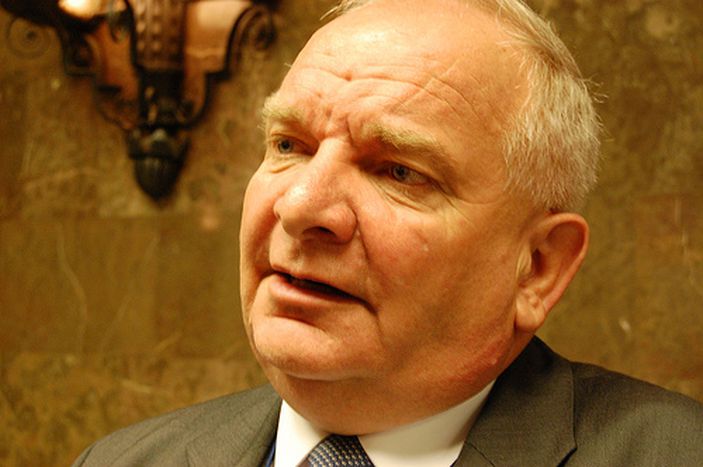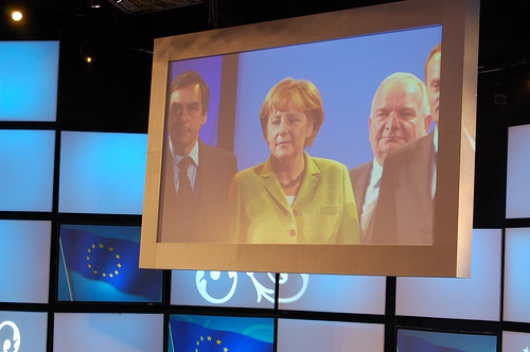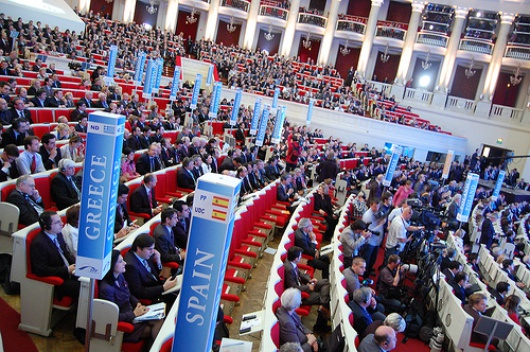
Joseph Daul: ‘when we get up and turn on the light, it’s the EU who decides what type of light bulb we can use’
Published on
Translation by:
Joss CornerIf the European centre-right wins the European elections again between 4 - 7 June, they will be able to use the key political positions in order to advance the EU. Helping Europeans combat the crisis and involve them in the construction of a community project: those are two sizeable challenges. Interview
Frenchman Joseph Daul is one of the most influential politicians in the EU. He is the president of the biggest group in the European parliament: the European people’s party (EPP) who will surely have the power to name the presidents of the European parliament (EP) and place the Portuguese Jose Manuel Durao Burraso at the head of the European commission for a second five-year mandate. We grab him in the corridor of the palace of culture and science at the EPP congress in Warsaw, where the manifesto for the European elections is being presented over two days.
What political record do you draw on for the 2004-9 term in the name of the EPP?
 The last five years have gone very quickly. At the beginning we thought things would continue to go smoothly and that we would grow even more. And then, this financial crisis arrived at the end of the term.
The last five years have gone very quickly. At the beginning we thought things would continue to go smoothly and that we would grow even more. And then, this financial crisis arrived at the end of the term.
Has this crisis been a stumbling block for the EPP?
It caught us off balance, even ideologically speaking.
Are you working on finding long term solutions?
We have always tried to promote the social free market economy. But within our group, there are some who have sometimes demanded more free market economy, claiming that we aren’t modern enough. Not enough with the times. Now, and with the crisis, we have returned to our true values. The values that the new state members have been trying to teach us for four years and that we’ve had for sixty years: family, the real needs…
Is it difficult to lead such a plural group?
Definitely! Every morning when I get up, I ask myself the same question: where is my majority today; with which country, which political groups, which parties? But it’s wonderful all the same, when at the end of the day we find a good compromise.
What are your feelings about the EPP’s results in the elections now that the British Tories have confirmed their friendly separation from the group?
I don’t think we’ll win all the seats back. We’ll win them again in Italy, Poland, fewer in Germany, I hope a few in France. Globally the feeling isn’t bad. The only thing that worries me is the level of turn-out. Since 2004 we haven’t been able to spark a strong movement, which is what Europe needs.
How can we encourage people to vote then, does there not need to be more transparency from European politicians?
 We are very transparent on the subject of MEPs attending sessions. On the other hand, we could be more so on the subject of public money. Spain is very transparent for example and this has repercussions in the level of turn-out for elections and the vote in favour of the project for a European constitution. We must show where Europe intervenes. I’ll give you an example: when we get up in the morning and we turn on the light, it’s the EU who decides what type of light bulb we can use; then when we take a shower, it’s the European standards which protect the water we use; when we have breakfast, it’s the European standards which protect or food; and when we use our cars it’s again the European standards on exhaust fumes which protect us.
We are very transparent on the subject of MEPs attending sessions. On the other hand, we could be more so on the subject of public money. Spain is very transparent for example and this has repercussions in the level of turn-out for elections and the vote in favour of the project for a European constitution. We must show where Europe intervenes. I’ll give you an example: when we get up in the morning and we turn on the light, it’s the EU who decides what type of light bulb we can use; then when we take a shower, it’s the European standards which protect the water we use; when we have breakfast, it’s the European standards which protect or food; and when we use our cars it’s again the European standards on exhaust fumes which protect us.
The web portal parlorama.eu ranks MEPs according to their participation in the daily workings of the EP. This site was temporarily shut down following pressure from the MEPs: does this initiative seem positive to you or on the contrary, not very constructive?
To be able to judge them, one must class the members of the EP in two categories (and I’m badly placed to talk about it as personally I got a good grade). On one hand there’s (Hans Gert) Pöttering, the president of the European parliament, who received a bad grade because he naturally doesn’t have the time write reports when he is constantly representing the EP. On the other hand, there are those who effectively don’t work. If we take the average, the result is clear and we need to get rid of the slackers. I missed three or four plenaries, but that’s because I was representing the parliament in Brussels, at the council. In any case, this type of initiative shows up the names of those who don’t work, which is a good thing.
For the next term, would the EPP prefer to share the presidency of the parliament with the British liberal Graham Watson or the German socialist Martin Schulz?
To make that decision we must wait for the election results and see who we can expect to have a majority of two-thirds with.
What are the qualities that you expect from the next president of the European commission?
(Laughs) That they do more than just wear the presidential suit and that they are a leader in the European game.
Must they have their own agenda or be content to be the intermediary between the member states, as we’ve seen Barroso do until now?
They must work to find the majorities and carry out their propositions.
Are you the candidate for the presidency of the EPP group for the next term?
Yes I am the candidate again.
Translated from Joseph Daul : « Il faut sortir les nuls du Parlement »



